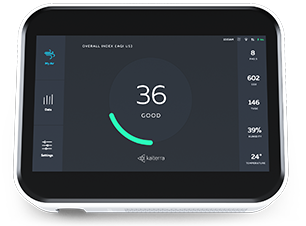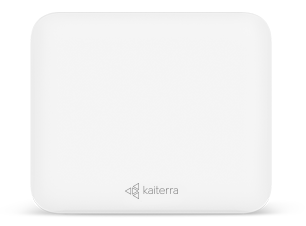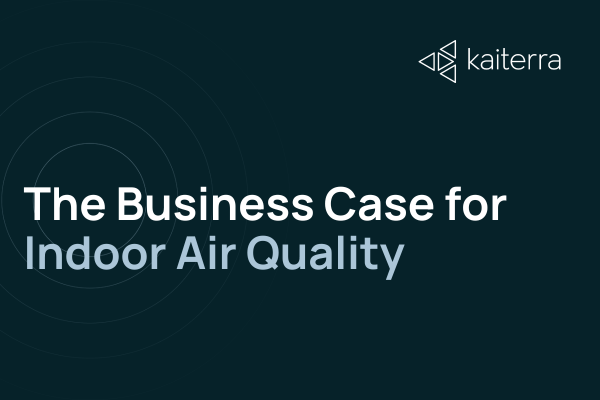Sensor technology
Laser particle sensor (Light scattering)
Mass concentration accuracy for PM2.5
0 to 30 μg/m³: ±3 μg/m³
30 to 1000 μg/m³: ±10 % m.v.
Mass concentration accuracy for PM10
0 to 30 μg/m³: ±3 μg/m³
30 to 1000 μg/m³: ±15 % m.v.
Mass concentration range
0 to 1,000 μg/m³
Mass concentration size range
PM2.5: 0.3 to 2.5 μm
PM10: 0.3 to 10.0 μm
Sensor output resolution
1 μg/m³
Calibration
Calibrated against standardized aerosol mix
WELL specification requirements
Adjustable particle density (K-factor) to accommodate project/region specific particulate profile.
Complies with WELL Performance Verification Guidebook to be used in WELL certification.
Sensor technology
Multi-pixel metal oxide sensor (MOx)
Accuracy
±15 % ±8 ppb
Measurement range
0 - 1000000 ppb
Sensor output resolution
1 ppb
Target gas profile
Complex mixture of 22 VOCs1 as defined by Molhave et al.
Sampling process
Calibration
Ethanol in clean air
WELL specification requirements
Calibration gas: ethanol
Target gas profile (ppb=µg/m³ conversion factor under STP): 22 VOC mixed per Molhav et al. (1 ppb = 4.57 µg/m³)
Complies with WELL Performance Verification Guidebook to be used in WELL certification.
Sensor technology
Non-dispersive infrared (NDIR)
Accuracy4
± 40 ppm ± 3%
Comply with ANSI/ASHRAE Standard 62.1-2022
Measurement range
400 to 2,000 ppm2
Up to 10000 ppm extended range3
Sensor output resolution
1 ppm
Target gas
CO2
Sensor technology
Digital sensor
Accuracy
±0.2 °C
Measurement range
-20 - 100 °C
Sensor output resolution
0.1 °C
Sensor technology
Digital sensor
Accuracy
±2 % RH
Measurement range
0 - 100 % RH
Sensor output resolution
0.1 % RH
Sensor technology
Microelectromechanical systems (MEMS) sensor
Accuracy
±0.3 hPa
Range
300 - 1100 hPa
Field of view
90 ° horizontal, 90 ° vertical
Range
0 - 60000 lux
Light channels
R/G/B/IR/C
Color temperature range
1000 - 10000 K
Focus
5.2 mm
Sensing angle
120°
Sensing distance
5 m
Coming soon:
CO
O3
NO2
Battery
6 x Li/SOCl2 AA size
Battery Life
Up to 8 years of battery life6 using Adaptive Sampling™
Over 4 years using a high frequency fixed sampling rate7, 8
USB-C
5V 0.5 A
(Cable not included)
PoE
Via PoE to USB-C converter
(Cable not included)
Frequency range (MHz)
Sub-Ghz wireless communication
IN865/EU868/US915/AU915/KR920/AS923
These frequency bands cover over 200 countries, contact Kaiterra for details on compliance in your location.
Gateway
Integration
BACnet/IP via Gateway
API
Data Storage
Cloud storage
Local data storage: 0.5 days
Data Sampling
Adaptive Sampling™ to automatically adjust sampling frequency to maximize battery life.
Selected sensors support a configurable sampling rate from 1 minute to 24 hours.
Compatible Modules
KM-300: Particulate Matter sensor module
KM-301: CO & O3 sensor module (Coming soon)
Calibration
Swappable sensor modules
Kaiterra’s platform architecture meets the most stringent security standards and is regularly subjected to 3rd party penetration tests. Read more about our security here.
Quality
RESET Grade B
Healthy Building
Works with WELL
Length
155 mm (6.1 in)
Height
35 mm (1.4 in)
Width
126 mm (5.0 in)
Weight
388 g (0.86 lbs)
Peel-and-stick installation for surface mount and drywall mount
Electrical junction box mount with screws
Operational temperature: -20 - 50 °C
Operational humidity: 5 to 95 %RH, non-condensing
- n-Hexane, n-Nonane, n-Decane, n-Undecane ,1-Octane, 1-Decene, Cyclohexane, m-Xylene, Ethylbenzene, 1,2,4-Trimethylbenzene, n-Propylbenzene, a-Pinene, n-Pentanal, n-Hexanal, Iso-propanol, n-Butanol, 2-Butanone, 3-Methyl-3-butanone, 4-Methyl-2-pentanone, n-Butylacetate, Ethoxyethylacetate, 1, 2-Dichloroethane
- Extended exposure to concentrations below 400 ppm may result in incorrect operation of ABC algorithm and should be avoided.
- Sensor provides readings in the extended range but the accuracy may be lower than that specified in the table.
- The accuracy specification covers environments ranging from 0-50°C and 0-80% RH, and complies with indoor air quality standards ANSI/ASHRAE Standard 62.1-2022 at 25°C.
- Sensor specifications are under controlled laboratory conditions. Field measurements may use localized ambient air quality and historical infiltration rates to enhance the accuracy and baseline readings of NO2 concentrations. This method is effective under typical indoor conditions but may not suit environments with persistently high indoor NO2 levels.
- Using Adaptive Sampling™ in a building with 15 devices, located in a typical North American city with mechanical ventilation and strong wireless signal strength to the gateway.
- During operating hours (9-5, Mon-Fri): one sample per minute for all sensors except particulate matter, and one sample every 10 minutes for particulate matter. Outside of operating hours: one sample every five minutes for all sensors except particulate matter sensor, and one sample every 60 minutes for particulate matter.
- Actual battery life may vary based on usage, environmental conditions, and other factors.
- Cellular is supported in select countries and regions.





.png?width=306&height=226&name=Menu%20C%20(2).png)
.png)
